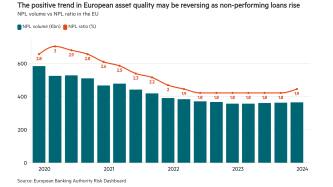Thanks to cross-border passporting, Icesave became a high-profile online brand in the UK. But when its parent Landsbanki collapsed in October 2008, Icesave depositors found they were not covered under any country’s deposit guarantee scheme. The UK government reluctantly stepped in and has been arguing with the Icelandic government over who should pick up the tab ever since.
Those difficulties will be returning to policy-makers’ minds following the EU’s stress-tests in July 2011. Two of the banks that failed the tests, Greece’s Eurobank and Austria’s Volksbank, have widespread operations in central and eastern Europe. Several of the near-miss banks in Greece and Portugal are also cross-border players.











